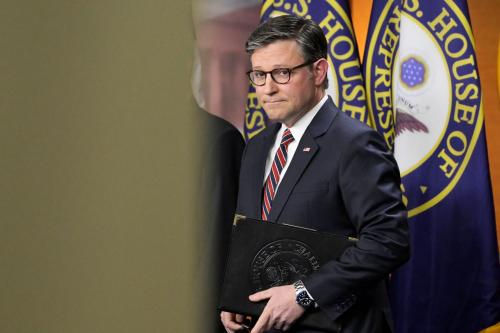Will the Budget Control Act, passed amid such agonizing partisan anger this week, prove to be first step toward a sensible bipartisan compromise that puts the federal budget back on a sustainable path? Or will it prove a harbinger of unproductive partisan gridlock that threatens American power and prosperity? We are hopeful that members will listen to a public fed up with name-calling and dysfunction in Washington and return from the recess ready to use the Budget Control Act to forge a balanced, bipartisan plan for entitlement and tax reform that will effectively restrain the rise in future debt. The 12-member joint committee created by the act can be the vehicle for this positive outcome — or it can fail.
We believe that a workable solution to America’s unsustainable projected borrowing must have three elements. First, it must slow the future growth of Medicare and Medicaid and put Social Security on a firm fiscal foundation. Because of the aging of the population and the rising cost of healthcare, these three programs are set to drive federal spending up faster than revenues can grow. They must be reformed to slow their future growth and ensure their much-needed benefits are available to future beneficiaries.
Second, our inefficient personal and corporate tax codes must be rewritten to reduce special purpose exemptions, exclusions and deductions — spending in the tax code — in order to raise more revenue with lower rates. A much simpler, more pro-growth tax code could produce the additional revenue that will be needed to support an older population even if entitlement programs are reformed.
Third, discretionary spending—both domestic and defense—must be capped in order to force Congress and the administration to reconsider the effectiveness of federal spending and direct it to the highest current priorities, including investment in future growth.
The bipartisan Debt Reduction Task Force, which we co-chaired at the Bipartisan Policy Center, produced a detailed plan with these three elements last December. Our members had strong views, but as we worked toward a solution together, we realized that all three elements were necessary and that partisan preferences had to be compromised to reach agreement. The National Commission on Fiscal Responsibility and Reform, appointed by President Obama and co-chaired by Erskine Bowles and Alan Simpson, worked through the same arithmetic to produce a somewhat different bipartisan plan with the same three elements. Obama and Speaker John Boehner (R-Ohio) reportedly came close to agreement on a “grand bargain” with the necessary three ingredients.
Unfortunately, the Budget Control Act makes actual budget reductions in only one of the three elements of the budget — discretionary spending — and relies on future budget process to tackle the rest. The discretionary spending caps, which affect both the domestic and defense sides of the budget, are nearly identical to those in the Domenici-Rivlin plan, but somewhat less severe than those in Simpson-Bowles. Additional deficit reduction is left to a 12-member joint committee with fast-track authority and an elaborate “sword of Damocles” that will impose much deeper spending cuts if the committee is not successful. Many members are afraid the committee will deadlock (or fail to secure passage of its plan) and that the “sword” will slash deeply into essential domestic programs, including Medicare, while others fear automatic cuts in defense will endanger American security.
They should be worried. The point of automatic cuts is to worry decision-makers so much that they will design a more constructive policy to avoid the automatic cuts. In this case, the constructive policy is entitlement reform to slow the growth of Medicare, Medicaid and Social Security spending gradually in the future, plus aggressive tax reform to broaden the tax base, lower the rates and raise additional revenue. The joint committee must turn to and produce such a plan. Our task force stands ready to help them, as, we are sure, does the national commission and many others. The essential staff work has been done.
Achieving a bipartisan grand bargain on future deficit reduction and avoiding more gridlock will take extremely strong leadership from both parties in Congress and from the president. We believe that is what the American public desperately wants and what the whole world needs from America. We hope members hear this message loud and clear from their constituents during the recess — and that they will listen.
The Brookings Institution is committed to quality, independence, and impact.
We are supported by a diverse array of funders. In line with our values and policies, each Brookings publication represents the sole views of its author(s).



Commentary
Op-edWe Need a Grand Bargain, Not More Budget Gridlock
August 3, 2011